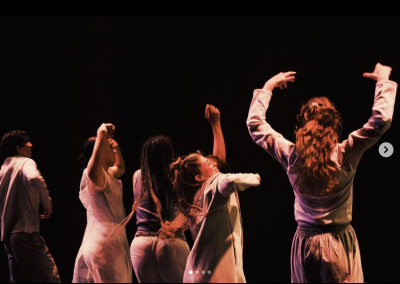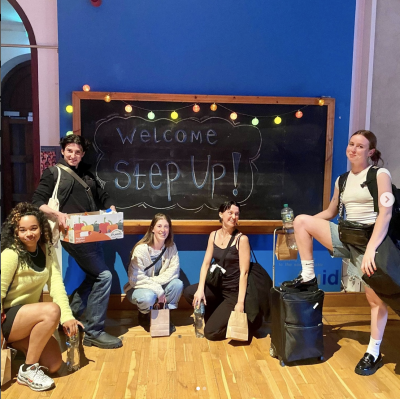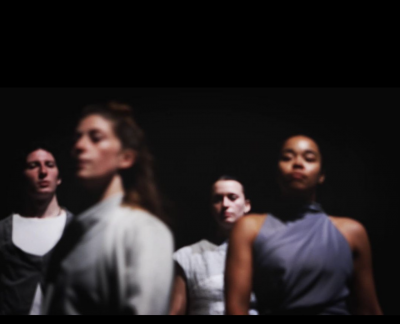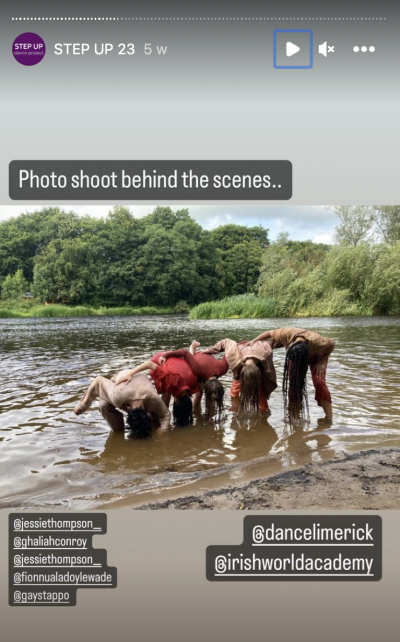As the first phase of Step Up 2023 comes to an end this week, I’ve been thinking about what it means to be a curator of the programme. Step Up was established as a partnership between the Arts Council, Dance Ireland, Dance Limerick and the Irish World Academy as a way to introduce to the dance community in Ireland dancers from the country who, at that point of necessity, would have had their dance training abroad. Trained in schools in the UK and across Europe, the risk was that generations of dance talent would establish their networks abroad and never connect with the vibrant dance community and its audiences in Ireland. The programme has had a variety of curators over the years, each bringing their own perspectives and responding to the changing needs of dance. When I became curator in 2021 at the invitation of Jenny Traynor, then director of Dance Limerick where Step Up has been mostly based, I wanted to underline again the founding intention of Step Up to be a project that would connect early career dance professionals in and from Ireland to the community there. I use the language of ‘early career professionals’ deliberately since not everyone who is entering the profession is graduating from conservatoires and I want Step Up to be an opportunity for all kinds of dancers for all kinds of backgrounds. It’s been fascinating to find talented applicants who have maintained self-directed dance training alongside other studies or who have come through dance styles and backgrounds that don’t necessarily get validated in contemporary dance training. I don’t assume that applicants will be young, since I want to hold open the possibility that people might be discovering dance and could enter the professional world at any age. And ‘professional’ is an important word, since we expect applicants to have trained – whether formally or informally – to a level where the are able to work professionally. But with that expectation of the dancers, I worked with Jenny to ensure that the dancers would now be paid for their work in the programme. Even though Step Up is a professional development opportunity, there will be people who could never take up such an opportunity if their time wasn’t paid for. And as professionals they deserve to be paid professionally.
It has also been important for me that Step Up offers early career professionals the chance to focus on being performing artists. The funding system in Ireland has tended to prioritise creative artists in a way that has incentivised performers to make work rather than see performing as a viable skill, craft and art that can be deepened and enriched with experience and opportunity. I’ve wanted to underline that contributing the performer’s art to the creative process makes work better for choreographers, audiences and other participants. That’s not to say that the dancers who have taken part in Step Up over the years haven’t also had choreographic practices that should be encouraged and developed. But I’m proposing that Step Up is a place to dancers to practice their skills as performers, in creation and in performance.
One of the skills that I’ve found valuable in performers that I’ve worked with over the years is an understanding of the context in which they are dancing. Some aspects of the performer’s life can encourage us to think of it as separate from other parts of society. We can often find ourselves making work in closed studios, meeting audiences at the end of processes and sometimes only sensing those audiences as presences in the dark beyond the glare of stage lights. I realise that this is not the case for the kind of work that many artists want to make but it can be a default approach in the way we’re trained for our work. Therefore I’ve tried to use Step Up as an opportunity for the dancers to learn about working in a particular context. With my choreography last year, our goal was to understand the supporters and players of Gaelic games, especially in Limerick where Step Up was based. And this year, with the choreographer Maria Nilsson Waller, the focus was on the river Shannon and the flow of life around it. Both projects asked the dancers to connect with local communities as inspiration, creative informants and ultimately as audiences – engaging with people in this more rounded exchange that shifts what can sometimes be a passive one-way audience relationship.
In both instances the creative process has invited the dancers out of the studio, asking them to adapt to dancing in different physical and social environments, developing a sensitivity that has an impact on physicality and performance quality. It’s important for me that dancers understand the value of their choice to dance in the world but unless we are brave enough to interact with the world around us in ways that allow direct input and feedback, then we don’t get to learn that value. I’ve seen the impact on dancers of finding why dancing matters to them and why it matters that they dance in this world. It changes how they show up in performance on stages and off, perhaps giving a confidence or at least a clarity of knowing why they are dancing. It’s that clarity and knowledge that I seek for myself and that I hope Step Up, under my curation and with the team that enables the programme, helps the dancers to find for themselves.

Congratulations to the Step Up 2023 dancers – Ben, Fionnuala, Ghalia, Jessie, and Saoirse – , to Maria and her collaborators, to the teachers who shared not only their dancing but their life experience, to Mufutau and Finola who led brilliant masterclasses on the Ultima Vez and German Tanztheater repertories, to the Dance Limerick team, to Ella as producer and Lucia as lynchpin and rehearsal director and to all the people who shared their ideas and support with the project this year. Step Up 2023 isn’t finished yet but it’s had a great start.
Thanks to Dance Limerick and photographers Maurice Gunning, Stace Gill and @iaramphotos for the photographs





Post a Comment